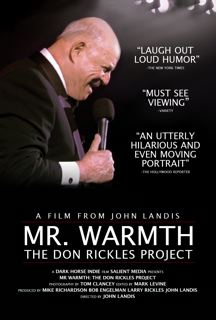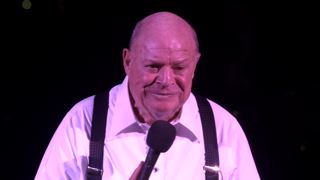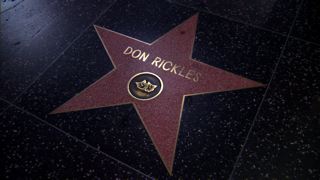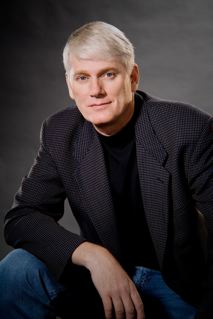For someone who's spent a lifetime laughing about people, golden-age comic Don Rickles has sure made a lot of friends. From Robin Williams and Chris Rock to Clint Eastwood and Sidney Poitier, a host of Hollywood stars step up in Mr. Warmth: The Don Rickles Project to celebrate this comedic legend in his own time. Directed by John Landis, Mr. Warmth reveals the background of one of THE legends of comedy. The show features never-before-seen concert footage of his Vegas act, plus behind-the-scenes conversations with Rickles, and includes interviews with many of his closest friends, and a wealth of memorable TV and film clips.
Dark Horse Comics' Online Marketing Manager, Matt Parkinson recently had an opportunity to speak with Mr. Warmth producers Mike Richardson, Robert Engelman, and Larry Rickles (yes, Don's son) about how this project came to be.
Matt Parkinson: Can we talk a little bit about how this project came together, and grew its wings?
Mike Richardson: Larry, you started this project.
Larry Rickles: Originally I always wanted to do a film about my dad. I thought the time was right to do some kind of special where you just see my dad, and who he really is. I went around and I created a DVD where I put together some material, and I passed it around. People wanted it to be like a roast, or his act, and I wanted it to be more of a documentary with more of a feel for who he really is. It went around, around, around, and around, and then my dad had dinner with John Landis, and John being John, said, "This is a great thing. Let's try to do it." And he got the DVD I made, and he took it from there, and made it into a real story. It wasn't just my dad's act, or a roast. He made it into a real film, and that's exactly what I really wanted it to be.
Matt: Bob, can you add a little bit?
Bob Engelman: As we started working on this project, it was actually starting off to be kind of a small film with a couple days of interviews, and shooting a bit of Don's act. Well, we had some very fortunate events where HBO supported us, and we got so much of the cast of their comedy festival that what was supposed to be four days of interviews turned into over twenty days of interviews. The project grew, and really became what it is. In terms of the story, like almost all documentaries, you go in with certain ideas, but the film is really shaped and recreated in editorial. Once we saw what we got-and we had volumes of material-we had anywhere from thirty minutes to three and a half hours with each person we spoke with. In the end, we pulled less than two minutes from each interview. So, you can see that we had many choices, and many different directions to go in.

Matt: Mike, how did you come to be involved in this project?
Mike: I initially found out about the project from a call I received from John Levin at CAA [Creative Artist Agency] who told me that Larry had stopped by there and talked to CAA about them possibly helping to get his documentary up and running.
Larry: That's correct. I pitched it around, and again they wanted it to be more like a roast or something, like his act. Then Mike came along and said, "You know, I'm gonna put up some money, and I'm gonna do this," and made it more of what I saw, and what Bob and John saw, as more of a film.
Mike: I didn't know Larry, at that point, or how seriously to take the CAA call, and I sort of forgot about it. But then I had the good fortune through John Landis and his wife, Deborah, to meet and have dinner with Don. I actually twisted John's arm to get that invitation, but we went over and I met Larry's dad, Don, who's an icon for all of us, of course. We had a great time with Don and his wife, Barbara. We went out for dinner and during the course of the dinner Don told me that one of his fondest wishes was that his son Larry would get a chance at bringing his documentary film to life. A short time before that, I had done a deal with Marty Greenwald and Image Entertainment, the DVD company, to produce a series of independent films, and I told Don on the spot that I would fund the documentary through my Image deal. Don was very excited, and he said, "Would you produce it with Larry?" and I said, "Absolutely." I talked with Image and they were very excited about the idea. Unfortunately, no sooner did I commit than another company attempted a hostile takeover of Image and they had to freeze all of their projects. So, because we had already made plans and begun work, I had to finance it myself until we found another investor, which was fine, because we all believed in the project. Anyway, John and I met a few days after the dinner with Don and Barbara to begin talks about actually doing the project. John Landis would direct and Larry, John, and I would produce. The first thing I said is that Bob Engelman had to be the line producer on the project. I've worked with Bob on many projects over the years, including The Mask, Mystery Men, and a number of other films. Bob and I work together regularly. So, Bob came in for a meeting and became our fourth producer as well as agreeing to become the film's actual line producer. I think it was that meeting where the project really took a serious turn toward becoming reality.
 Bob: What I also want to state here is that when we originally started, and were having our issues with Image falling out and looking elsewhere for funds, no one would come up with the money. At that point, Mike really became our guardian angel. He stepped in and financed the film, and he really had no guarantee that anyone else would ever come in and buy the film, because no one believed in the film the way the four of us did.
Bob: What I also want to state here is that when we originally started, and were having our issues with Image falling out and looking elsewhere for funds, no one would come up with the money. At that point, Mike really became our guardian angel. He stepped in and financed the film, and he really had no guarantee that anyone else would ever come in and buy the film, because no one believed in the film the way the four of us did.Larry: Exactly right!
Bob: So, while we all put in sweat equity. Mike actually put in hard cash, and we began to make this movie. We were able to create, basically, a fifty-five-minute kind of rough cut that we were able to show at the Aspen Film Festival, and all of a sudden the film community could really see how brilliant this film could be, and how impressive it could be. All of a sudden HBO got very committed, and came up with even more money than we thought they would, and through that deal we were able to find a DVD partner.
Mike: I have to say that the minute that Larry brought in the clip that he had put together, I knew we had something very special. I mean, we all wanted to work with Don badly, that was our main motivation, but when we saw Larry's piece, we knew that we really had something. Wouldn't you agree with that, Bob?
Bob: Absolutely, we all had a vision of what this film could be, but in the beginning we could not get anyone to see it the way we did.
Larry: They only saw Don Rickles in a certain light, and we saw it as it should be-bigger. That's really what we went for . . .
Mike: And by the way, John Landis is a brilliant director. He was able to put on film this amazing documentary that's more than just a visual history of Don's career. It gets into the very human element that allows Don to be so successful. There's no one that can do what Don does. You'll understand why that is when you see how Don works or when you spend time with him. He's a loving, caring person, and people immediately pick up on that. John was able to convey the part of Don that might be difficult for someone to understand from a distance. When you're around Don or see Don in person, you understand why he is able to do what he does so successfully.
Larry: And the people that come up to him now are saying, "We didn't realize what a career [you've had]. Look at your life. Look at what you've done." Most people only saw him in a certain light. Now they're seeing the whole big picture with his acting, with everything!
Bob: It also becomes a history of not only the entertainment business, but also a real history of Las Vegas. Additionally, what's so fascinating to me about this film is that it's told through these performers. Believe me, you will never see a movie that will have this many talented comedians in it! We deliberately went after Don's contemporaries, that sort of very, very established group, and then we went after the young comedians. And so you see the perspective from several decades of comedians.

Matt: Larry, how was your father's reaction to everything?
Larry: Well that's the thing, my dad is the film's biggest fan! I mean, he's watching this on On Demand right now! I mean, he loves it. And the acclaim that he's getting from it is amazing! I mean, he went out to a dinner the other night, and Al Pacino said to him he saw it twice. I mean, people you would never expect to see this film are all saying the same thing, "We didn't know what a career he's had." You know? And that's what I'm most proud of, that when you see the documentary it really is this whole picture. I can say "That's my father." I could point to the screen and say, "That's who my dad really is."
Mike: My greatest pleasure in this whole project was the fact that Don loves it. To me that's the most rewarding thing about the film.
Bob: I've never met a single person yet, who has seen this film, who hasn't loved it.
Larry: And if you don't like it, you don't like him!
Bob: But I haven't heard anyone say they didn't like it, and I spoke in New York, in Austin, and in Palm Springs in California. So, I hit both coasts and the center of the country, and it's the same reaction everywhere. They all love him.
Producer Mike Richardson

Matt: It sounds like with all the interviews that were conducted you ended up with a substantial amount of footage. Are we going to see an extended release of this documentary?
Bob: Absolutely. When the DVD is released, we have an hour of additional footage, which are extended interviews. Some of the stories are hysterical and outrageous, but some of them go on for ten minutes. So, we couldn't really put them in the movie, or they weren't about Don. But, we've created a whole separate DVD of the extras that will come out when the DVD is sold commercially.
Matt: Anything else that you guys would like to mention?
Larry: One thing. When you read all the great reviews about this documentary, it wasn't like people were banging down our door originally to do this. It was Mike, Bob, and John. They really just made it happen. It wasn't like HBO was saying, "Here's all this money," and, "Go make it." It was really everyone together doing it.
Mike: Well, we had to show people what was there. I mean, once they saw the piece John put together everyone started lining up. In the early days of the project, people didn't really understand what we were trying to do. I don't think they realized what was there in Don's background, as amazing as it seems. I think they saw him strictly as a stand-up comedian, and didn't really know the depth that his body of work had.
Bob: Well, one very important point too is, Don has never allowed his stand-up show to be filmed before. So, this is the first time that his act has ever been on film.
Mike: Yes, that's true. People will see Don on stage doing parts of his act, and that's never been available before. They'll also be surprised to see the number of movie clips John has pulled from his film career. I think it's surprising for people to learn, and Larry, you can tell me if this isn't true, of the film career that he has had. I don't think that people really realize that his film career has spanned five decades. Also, in the documentary, one of the comedians points out that when he was a kid Don guested on so many television shows that it seemed as though he had his own show.
Larry: Right, and I think the movie shows that too. That's what he wanted to be! He wanted to be an actor! That's how he really started out. The insults, and the wisecracks, all that stuff, were a defense mechanism, and eventually that became his act! It worked for him. Can you believe that he was on Johnny Carson more than any other person-ninety-nine times.
Matt: Thanks for taking the time to speak with us.